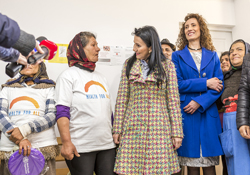World Health Day 2018 in the WHO European Region – making health about the people, for the people

WHO/Costin Simion
On World Health Day 2018, WHO called on all countries to make universal health coverage (UHC) a political priority, using available evidence and tools to determine their own path to health for all. This year’s World Health Day also marked the 70th anniversary of WHO, and the start of a 2-year campaign to raise awareness and advocate for action towards UHC.
Countries celebrated World Health Day on 7 April in many different ways. Activities and events across the Region ranged from high-level meetings and press conferences to community activities and celebrations.
Health promotion as a cornerstone of UHC
UHC is central to achieving better health and well-being for all people at all ages. It delivers disease prevention, health promotion, and treatment for communicable and noncommunicable diseases alike, while ensuring that individuals are not driven into poverty because of high health-care costs.
Health promotion was the focus for various countries in their World Health Day celebrations. In Croatia, for example, President Kolinda Grabar-Kitarovic marked World Health Day by inviting the public to an event at her offices to check their blood sugar and blood pressure, and to learn basic first aid and more about healthy lifestyles. “Modern people aspire not only to live longer, but also to live better,” President Grabar-Kitarovic said.
“Investing in prevention – path to better health” was the theme of the World Health Day event in Montenegro, where the focus was on immunization and cancer screening. WHO and national and local partners all agreed on the need to invest more in preventive health care to speed up progress towards UHC in Montenegro.
In Czechia, WHO supported the International Federation of Medical Students’ Associations in organizing health promotion activities in 6 cities across the country. Medical students counselled the public on how to quit smoking and provided body fat percentage testing, among other activities. In Slovakia, where the focus was on overweight and obesity prevention, regional public health institutes provided individual counselling on blood cholesterol, body mass index and waist measurement.
Vingis Park in Vilnius, the capital of Lithuania, was the venue for an active celebration of World Health Day. Primarily focused on healthy ageing, the day included tai chi exercises and Nordic walking for the 300 participants, as well as a programme of songs, poems and other creative ways to advise the public on how to be and stay healthy.
Working together with the media
The road to UHC is unique for each country; each faces its own challenges and is equipped with its own strengths for making UHC a reality for its population. To initiate a broad discussion on how each country can reach UHC, various WHO country offices worked closely with local media.
The WHO Country Office in Serbia organized a breakfast meeting for journalists to highlight the importance of continuing to work towards UHC in the country. This event featured a UHC quiz and statements from opinion leaders such as celebrity singer Leontina Vukomanovic about different aspects of UHC. It also brought key partners together to celebrate WHO’s 70th anniversary.
WHO country offices in, for example, Azerbaijan, Czechia, Estonia, Montenegro and Poland widely disseminated information to the media on UHC. WHO country offices in Armenia, Bulgaria, Latvia, Kyrgyzstan, the Russian Federation and Slovakia, among others, organized press conferences with the presence of top news agencies, resulting in widespread media coverage.
World Health Day celebrated by and with partners
UHC is impossible for one ministry, sector or part of society to achieve alone. It requires broad and multisectoral effort. It was therefore fitting that World Health Day 2018 was celebrated by a variety of actors taking multiple approaches to promoting UHC among the public, health-care workers, policy-makers and other partners.
In Kyrgyzstan, for example, national authorities organized a flash mob, conducted express master classes on blood pressure measurement and distributed materials on healthy lifestyles. The WHO Country Office team in Kyrgyzstan also participated in a public running event to celebrate WHO’s 70th birthday and to promote UHC.
In Latvia, a medical conference on UHC with approximately 400 participants featured numerous opinion leaders and influencers discussing what action the country must take to move towards UHC. In Poland, numerous local celebrations took place at schools, town halls and local units of sanitary stations.
A press conference was organized in Romania at a community health centre to highlight the importance of community health programmes in achieving UHC. Romanian Minister of Health Sorina Pintea led discussions with beneficiaries and health-care workers at the Gostinari community health centre about how to bring better services closer to the people.
The Republic of Moldova observed World Health Day by recognizing health professionals for their dedication and leadership during a national awards ceremony on 11 April. Awards were given in categories such as best family doctor, best nursing team, best emergency team, best health nongovernmental organization, best health journalist and more. The WHO Country Office was among the organizations supporting the fifth edition of this event.
Setting UHC as a strategic priority for WHO’s work
The 2030 Agenda for Sustainable Development underlines that health is vital for the future of our world. With a commitment to achieve Sustainable Development Goal (SDG) 3, which calls on all stakeholders to “Ensure healthy lives and promote well-being for all at all ages”, WHO will lead a transformative agenda that supports countries in reaching all health-related SDG targets – especially in advancing UHC.
UHC is also one of the strategic priorities in WHO’s draft Thirteenth General Programme of Work 2019–2023, which sets the direction for the Organization’s work at global, regional and country levels for the next 5 years and beyond.



